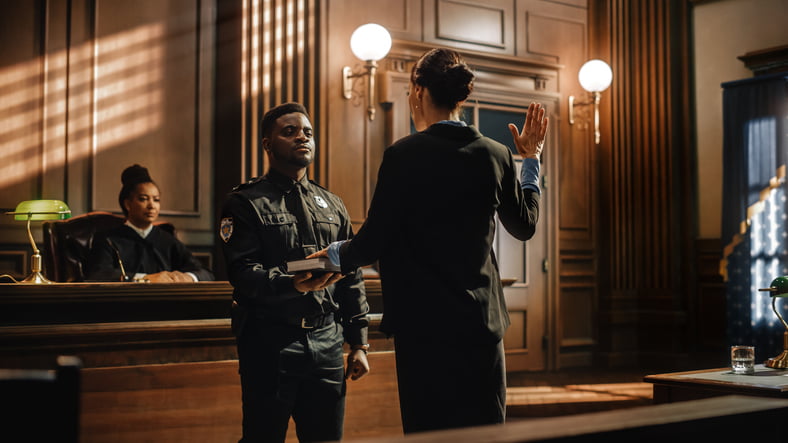Being called to testify in court can be an overwhelming experience, especially when subjected to questioning by skilled lawyers. Whether you are a witness, an expert, or even the defendant, effective preparation is crucial to ensure you present your case clearly and confidently. This article aims to provide you with valuable insights and strategies to help you navigate the questioning process in court, enhancing your chances of delivering accurate and persuasive testimony.
- Understand the Purpose of Questioning: Before delving into the details of how to prepare, it is essential to comprehend the fundamental purpose of questioning in court. The primary goal is to gather information and evidence to establish the truth. The lawyers involved will employ different questioning techniques to elicit specific responses, challenge credibility, and highlight inconsistencies. By recognizing this objective, you can better prepare and adapt your approach accordingly.
- Review and Familiarize Yourself with the Case: Thoroughly reviewing the case materials, including relevant documents, reports, and statements, is crucial to understanding the context in which you will be questioned. This step allows you to refresh your memory, identify potential areas of inquiry, and anticipate the opposing lawyer’s strategies. Take detailed notes and seek clarification on any aspects that seem unclear to ensure you have a comprehensive understanding of the case.
- Seek Legal Guidance: If you are involved in a legal proceeding, it is strongly recommended to consult with an experienced lawyer. They can provide valuable advice and guide you through the intricacies of the legal process, including questioning in court. A lawyer can help you understand the rules of evidence, objections that may be raised, and assist in developing your testimony to align with your legal strategy.
- Practice and Rehearse: Preparing for questioning should involve practicing and rehearsing your responses. Enlist the help of a trusted friend, family member, or even your lawyer to simulate a mock questioning session. This exercise will help you become more comfortable with the process, refine your answers, and identify areas that may require additional clarity or support. Video recording your practice sessions can be especially beneficial, as it allows you to review your performance objectively.
- Maintain Composure and Credibility: While being questioned, maintaining composure is vital. Stay calm, speak clearly, and avoid becoming defensive or argumentative. Projecting confidence and credibility can significantly impact how your testimony is perceived. Focus on answering questions directly and truthfully, and avoid speculation or assumptions. If you do not know the answer to a question, it is perfectly acceptable to say, “I don’t know” rather than guessing or fabricating information.
- Listen Carefully and Seek Clarification: Active listening is essential during questioning. Pay close attention to the questions being asked and ensure you understand them fully before responding. If a question is ambiguous or confusing, do not hesitate to seek clarification from the lawyer before answering. This approach helps prevent misunderstandings and ensures that your responses are accurate and relevant.
- Stay Within the Scope of the Question: One of the most critical aspects of answering questions in court is to stay within the scope of each question. Do not volunteer extra information or offer opinions unless explicitly asked. Answer concisely and truthfully, avoiding lengthy explanations or digressions. By adhering to the question’s scope, you minimize the risk of providing unintended ammunition to opposing counsel and maintain control over your testimony.
- Beware of Leading Questions: Opposing lawyers may employ leading questions that suggest or imply specific answers. Be cautious when faced with such questions and focus on answering truthfully based on your own knowledge and recollection. Do not feel compelled to agree with an inaccurate or misleading premise. Instead, re-frame your response to provide an accurate account of the events or facts in question.
- Prepare for Cross-Examination: If you are a witness, anticipate the possibility of cross-examination, where the opposing counsel will attempt to challenge your credibility or discredit your testimony. Be mentally prepared for aggressive questioning tactics, but remember to remain composed, stick to the facts, and avoid getting rattled. It can be helpful to engage in further mock questioning sessions specifically designed to simulate cross-examination scenarios.
- Follow Courtroom Etiquette: Lastly, familiarize yourself with courtroom etiquette and protocols. Dress appropriately, maintain professional demeanor, and address the judge as “Your Honor.” Avoid interruptions, speak clearly and audibly, and always wait for the lawyerto finish asking a question before responding. These courtesies demonstrate respect for the legal process and enhance your credibility in the eyes of the court.
Conclusion: Being prepared for questioning in court is essential to ensure you provide accurate, persuasive, and credible testimony. By understanding the purpose of questioning, reviewing the case, seeking legal guidance, practicing and rehearsing, maintaining composure, and following courtroom etiquette, you can significantly improve your ability to navigate the questioning process successfully. Remember, preparation is the key to confidence, and confidence is the key to presenting a strong case in court.



